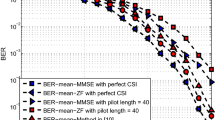Abstract
Theoretical error rate performance of wireless communication systems are usually determined assuming that the perfect channel state information (CSI) is available at the receiver. However, in actual practice, the channel gains at the receiver are obtained via using some channel estimation (CE) techniques. Due to inherent presence of noise, the CE is not perfect resulting in the performance degradation. In this paper, we evaluate the error rate performance of an uplink multicarrier code-division multiple-access (MC-CDMA) system, considering different modulation techniques, where CE is performed using pilot symbol assisted (PSA) minimum mean-square error (MMSE) CE technique. The symbol error rate (SER) analysis of an uplink MC-CDMA system using multiuser detection techniques, such as MMSE and zero forcing (ZF), is presented under imperfect CE. Simulated results for SER are also shown to confirm the accuracy of the analytically derived results.
Similar content being viewed by others
References
Riera-Palou F., Femenias G., Ramis J. (2008) On the design of uplink and downlink group-orthogonal multicarrier wireless systems. IEEE Transactions on Communications 56: 1656–1665
Hanson L., Munster H., Choi B. J., Keller T. (2003) OFDM and MC-CDMA for broadband multiuser communications, WLAN and broadcasting. Wiley and IEEE Press, Chichester
Trivedi, A., & Gupta, R. (2007). Performance of pilot symbol assisted channel estimation techniques for uplink MC-CDMA systems using MMSE receiver. In Proceedings of the IEEE PACRIM’ 07 (pp. 601–604).
Choi Y. C., Voltz P. J., Cassara F. A. (2001) On channel estimation and detection for multicarrier signals in fast and selective Rayleigh fading channels. IEEE Transactions on Communications 49: 1375–13879
Sanguinetti L., Morelli M., Mengali U. (2004) Channel estimation and tracking for MC-CDMA signals. European Transactions on Telecommunications 15(3): 249–258
Sanguinetti L., Morelli M. (2006) Channel acquisition and tracking for MC-CDMA uplink transmission. IEEE Transactions Vehicular Technology 55(3): 956–967
Patel, C. S., Stuber, G. L., & Pratt, T. G. (2004). Analysis of OFDM/MC-CDMA under imperfect channel estimation. IEEE conference WCNC (pp. 954–958).
Morelli M., Mengali U. (2001) A comparison of pilot-aided channel estimation methods for OFDM systems. IEEE Transactions of Signal Processing 49: 3065–3073
Trived, A. & Gupta, R. (2008). Improved ML channel estimation for uplink MC-CDMA systems in closely spaced multipath channels accepted in Springer Intl. Journal on Wireless Personal Communication (published online in Dec 2008).
Riera-Palou F., Femenias G., Ramis J. (2007) Performance analysis of multiuser detectors for uplink quasi-synchronous MC-CDMA systems. Springer’s Wireless Personal Communincations 43(4): 1511–1521
Kalofonos D. N., Stojanovic M., Proakis J. G. (2003) Performance of adaptive MC-CDMA detectors in rapidly fading Rayleigh channels. IEEE Transaction on Wireless Communications 2(2): 229–239
Hanzo L., Yang L. -L., Kuan E. -L., Yen K. (2003) Single and multi-carrier DS-CDMA multi-user detection, space-time spreading, synchronization and standards. Wiley and IEEE Press, Chichester
Proakis J. G. (1996) Digital communication (3rd ed.). Mc-Graw Hill, New York
Yang B., Lataief K. B., Cheng R. S., Cao Z. (2001) Channel estimation for OFDM transmission in multipath fading channels based on parametric channel modeling. IEEE Transactions on Communications 49: 467–479
Haykins S. (1998) Adaptive filter theory (3rd ed.). Prentice Hall, Englewood Cliffs
Winters J., Salz J., Gitlin R. (1994) The impact of antenna diversity on the capacity of wireless communications systems. IEEE Transactions on Communications 42: 1740–1751
Gao H., Smith P., Clark M. (1998) Theoretical reliability of MMSE linear diversity combining in Rayleigh-fading additive interference channels. IEEE Transactions on Communications 46: 666–672
Malik R., Win M., Chiani M., Zandella A. (1994) Bit-error probability for optimum combining of binary signals in the presence of interference and noise. IEEE Transactions on Wireless Communications 3: 395–407
Rapparport T. S. (2002) Wireless communications-principles and practice (2nd ed.). Pearson Education, Englewood Cliffs
Sanguinetti L., Cosovic I., Morelli M. (2006) Channel estimation for MC-CDMA uplink transmission with combined equalization. IEEE Journal of Selected Areas in Communications 24(6): 1167–1178
Author information
Authors and Affiliations
Corresponding author
Rights and permissions
About this article
Cite this article
Trivedi, A., Gupta, R. Error Rate Analysis of Uplink MC-CDMA Systems under Imperfect Channel Estimation. Wireless Pers Commun 59, 297–312 (2011). https://doi.org/10.1007/s11277-010-9918-6
Published:
Issue Date:
DOI: https://doi.org/10.1007/s11277-010-9918-6




